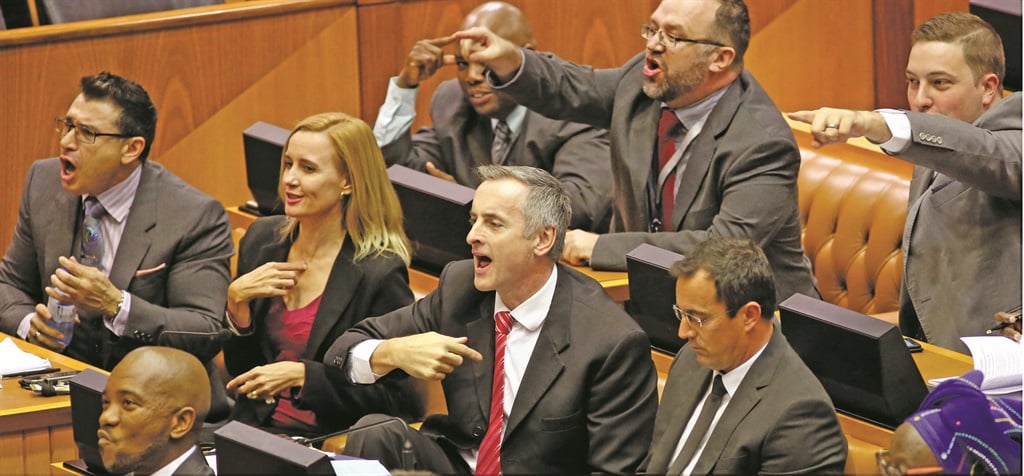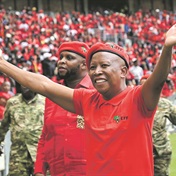
Mmusi Maimane and John Jeffery state their respective reasons for saying the Constitutional Court judgment means Zuma must go or stay
Mmusi Maimane, leader of the DA, official opposition
As the official opposition, the DA’s job is twofold: we must hold the current government to account and we must win elections so that we can replace that government. The first is our constitutional duty and the second is the very reason we exist as a party. Sounds simple enough, but you’d be amazed at how often we get second-guessed for doing this job.
Tuesday’s impeachment debate in Parliament was neither opportunistic nor frivolous, despite what some of the “analysts” claim. It was no less than our sworn duty. When the Constitutional Court found that President Zuma had failed to “uphold, defend and respect the Constitution”, we would have betrayed the 4 million voters who elected us to Parliament to guard the Constitution if we had done nothing.
Every opposition party shared that same obligation, which is why there was such a united front in favour of the motion. Every party recognised the president’s violation of the Constitution as an impeachable offence. Every party, that is, except for the ANC. Its spin doctors and parliamentary defenders would have you believe that the president’s failure to honour the findings of the Public Protector was just a petty breach of the Constitution – a minor infraction by a man who was “poorly advised” – and that a disingenuous non-apology would suffice in putting the matter to bed.
They even went as far as comparing President Zuma’s constitutional violation to two earlier Constitutional Court rulings, against former presidents Nelson Mandela in 2000 and Thabo Mbeki in 2010, in an effort to diminish his wrongdoing. This is preposterous, as the two court cases in question had nothing to do with those two presidents’ sworn duty to uphold, defend and respect the Constitution as per section 83(b). They were both rulings on legislative procedure pertaining to the normal duties of a president, and not on a deliberate constitutional violation to ensure personal enrichment.
That the ANC spin had to sink to this level to cobble together a defence says all you need to know about both President Zuma’s position and the inclination of his entire party to defend him blindly. They then went on to invoke biblical passages on forgiveness, and even tried to convince us that the president ranks among the greatest leaders in the world, thanks to his capacity to humble himself in magnanimous apology. I certainly don’t need to tell you what South Africans, and indeed the world, make of this claim.
The DA went into Tuesday’s impeachment debate knowing that Zuma’s ANC would not support our motion. We knew that every cadre deployed to protect the president would choose him over our Constitution and the people of South Africa, and that this would leave us more than a hundred votes short. Even if we had chosen to lobby ANC members for weeks before filing the motion, it would not have changed the outcome. But does this mean we shouldn’t have gone ahead with the motion? Absolutely not.
We cannot cherry-pick where and when we perform our constitutional duty based on what we think the ANC might or might not do. Our responsibility to our voters is to defend the Constitution to the letter. It’s not to back off, and give the ANC time and space to heal itself. Our goal is not a South Africa under an ANC government led by someone else. The ANC is fatally compromised, and the public can now see that Jacob Zuma is just a symptom of the party’s corruption disease. Like a crate of rotten apples, the entire organisation needs to be tipped out. The ANC may have won the impeachment vote, but in doing so it showed us exactly why it can no longer be the party of government. The ANC will pay for this in the vote and that is what really matters.
John Jeffery, deputy minister of justice and constitutional development
The DA, in its draft resolution, claims that the president seriously violated the Constitution by instituting parallel investigative processes and failing to implement the Public Protector’s remedial action.
But here’s the issue: the Constitutional Court judgment stated that the president failed to uphold, defend and respect the Constitution. In the order, it stated that his conduct was inconsistent with the Constitution. The court did not find a “serious violation”, as section 89(1)(a) of the Constitution requires. There is a difference, whether the DA likes it or not, between an inconsistency and a serious violation. In fact, the Economic Freedom Fighters specifically wanted the court to declare that the president violated his oath of office – but the court did not declare this. Nor did it declare that the president perpetrated “a serious violation of the Constitution or the law”, committed “serious misconduct”, or showed any “inability to perform the functions of office”. It is only on these grounds that Parliament may remove the president. So it is the DA – not the Constitutional Court – that is saying the president committed a serious violation of the Constitution.
Prior to that determination, there was no legal certainty on the matter of whether the Public Protector’s remedial action was binding or not.
And it was upon this legal uncertainty that events unfolded as they did.
In November 2000, then Public Protector Advocate Selby Baqwa told the SA Press Association at the International Ombudsman Institution Conference that “while he had no statutory powers, government implemented about 90% of the recommendations made by his office”.
This argument appeared to be confirmed in the Democratic Alliance v SABC and Others case, where Judge Schippers in the Western Cape High Court confirmed that the Public Protector was not a court of law, and the findings and remedial action imposed by that office were not binding and enforceable. It was against this legal backdrop that the Public Protector’s remedial action was viewed as not binding and events unfolded as they did.
So what opposition parties now, with the luxury of hindsight, say is crystal clear was not always so crystal clear. It was not even so crystal clear to the Public Protector herself.
The president and the House never acted with mala fides – in other words, in bad faith. The president acted in the justified belief that he was entitled to do so in terms of the Constitution. So his failure to fully implement the recommendations of the Public Protector or take the report on review was in the belief, for which there was considerable support at the time, that the remedial action was not binding. There are opposition parties who want to create the idea that when someone is handed a report by the Public Protector, they must simply comply with it as if it were a court order. This is not the case. The Constitutional Court itself held there is not an absolute bar to what some see as a “parallel” investigative process. The court held: “The president was … entitled to inquire into the correctness of those aspects of the report he disagreed with. That inquiry could well [have] led to a conclusion different from that of the Public Protector. And such a contrary outcome is legally permissible.”
The president has issued an apology, and assured the nation that he acted in good faith and never knowingly and deliberately set out to violate the Constitution. He has undertaken that he will abide by the judgment. He has agreed to pay for the non-security measures implemented by the department of public works at Nkandla. The minister of finance has given the assurance publicly that Treasury is putting together a team with the necessary technical expertise to execute the mandate given by the court. The president, the executive and Parliament will do exactly as the court has ordered – as we believe in the rule of law and because we uphold the Constitution.




 Publications
Publications
 Partners
Partners








